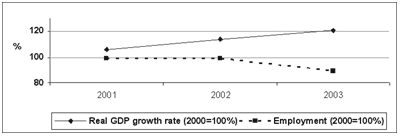Socioeconomic Commentaries

Employment is the Key Issue
Galina Selari, 16 June 2004
The economic growth, its quality, rate, parents and sustainability is one of the vexed question today. And it is widely discussed by politicians, economists and journalists. The issues of export-import, migrants' remittances and others are put on the discussion.
However, the key question - employment has remained in the shadow.
The problem of labour resources use remains very acute and that why it should be solved urgent.
Economic transformations and changes in ownership structure resulted in changes in labour relations and employment sphere. During the first phase of economic reforms the response of Moldovan labour market to sharp decrease in industrial output appeared as average wage cut but not as release labour. So, as compared with 1990, in 1996 the GDP dropped by 63%, amount of wage - by 80%, but the number of employed population - by 20% only. At the same time the king-size shadow economy was created and the unconcealed shadow employment without any legal background or labour contract was in blossom.
The fact that economic growth occurred in Moldova during the recent years came to 6-% on annual average has had no evident positive influence on labour market. It is a pity, but economic growth can't eliminate all social deformations by itself and to belief that it can make this is no more than illusion. And such illusions should be disappeared.
In fact, the sizable increase of production had not resulted in job growth but even more the number of employed persons slightly decreased and the number of unemployed went up.

But for all that even an employed person could be considered as semi-employed: in 2003 the average monthly wage size was only 34% above the minimum subsistence or enough to cover nearly 70% of minimal consumer budget.
Within certain limits this could be explained by underemployment: those who worked less than full time or are in unpaid vocation (about 5-6% of total employment) and those who work full time, but both the work and income is shared, i.e. ineffective use of labour force.
The shadow employment still exists either. It simply adjusted to new realities: now we have legal labour contracts, but often they have a formal character and as before based on the principle - "as we will agree".
Such marginal forms of relations at the labour market have become rather stable. And, strictly speaking, there is no reason to believe that they will ever be eliminated in the foreseeable future.
It appears that this is exactly the price our market has paid over the decade of not-so-consequent reforms.
And here is another illusion: everything depends on investments; once funds are invested into economy, we will succeed in everything, the growth will become sustainable and the universal revival will begin, as well as all other kinds of grace.
There is no doubt that we need investments - labour force follows the production capital flow. And Moldova has been a visual proof of this during all last years. Almost every third family has now its "representative" abroad. In 2003, circa 280 thou of our compatriots worked abroad earning their living (Household Budget Survey data). Naturally, a gradual mental re-evaluation takes place: "work to live" rather than "live to work".
And a question arises - whether our labour market is ready for the investments inflow? There is no simple answer, unfortunately. A phenomenon has formed: stable unemployment coexists with the labor force deficit. Say, there is an excess of managers and jurists, while metalworkers and turners are needed. It turns out that workers of specific professions, specific qualification, specific skills are needed, rather than just workers. And the current labour market often falls behind the real needs of the economy.
The demographic forecasts are also distressing. It looks like 2003 was the last year of the population growth and the absolute number of persons able to work will decrease in the future. In 2010 labour resource growth will make up no more than 9 thou persons and in 2015 the negative growth is expected of 20 thou persons at least (the calculations are very approximate as the last population census was conducted in 1989). One could supplement this with the loss of workers from prolonged unemployment: a person loses qualification after about a year of involuntary idleness and unsuccessful search for work (now, the average period of unemployment in the country is 23 months). Moreover, there is an acute lack of persons who know to work in a workmanlike manner. The reason is obvious: neither employers, nor workers are ready for the full-fledged market relations.
A conclusion arises: the labour market is not ready for investments. Moreover, it is - in a certain sense - a hindrance to activization of investment processes. And if the market is not ready for investments, it is possible that they will not happen or will not yield the expected result.
What can and should the state do under such difficult conditions/ firstly, it should elaborate a complex programme of actions in the socio-labour sphere - a labour market concept and measures of its implementation, i.e. create an effective and civilized labour market in Moldova, which would operatively supply employers with the labour force of required qualification and workers - with the work and adequate wage.
So, with solving employment problem we will achieve both most important our goals: sustainable economic growth and poverty reduction.
|